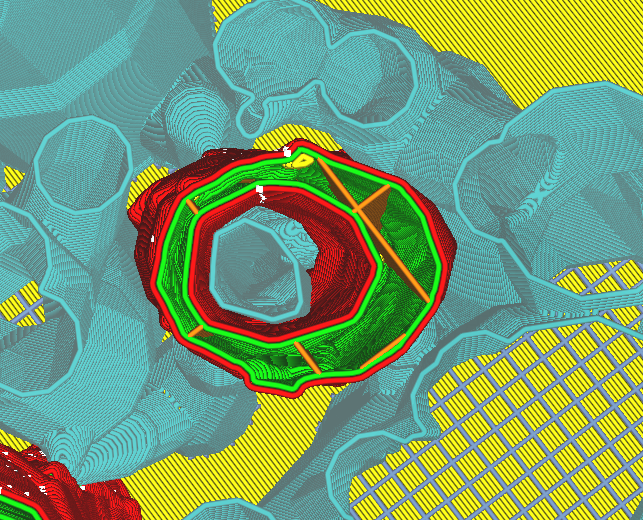I have a model I want to print that has multiple layers of internal walls. They are useless and can’t be seen in the finished product, like a hollow cylinder inside another hollow cylinder.
I can’t seem to figure out how to prevent the slicer from including those useless parts. I’ve tried with Cura and PrusaSlicer. Is there another tool I should be using for this?
Slicers are not really the right tool. They are meant to take models and turn them into prints. More likely you’ll need to use a mesh/model editor to remove them and repair the stl to show closed surfaces inside.
However. Think for a second why the modeller added those internal walls. Do they add structural support to assist in printing the upper face of the part?
The model I’m trying to print is a figure. The legs have an outer wall with infill, and then another inner wall with no infill but supports. Same for the chest area. This is what it looks like in Cura

It’s possible that this model was never meant to be printed (or it wasn’t intended for a typical FFF-type printer). The people who have said you need to edit the stl file directly appear to be correct. Once you’ve got it edited, you may want to make the fill denser to prevent anything odd from happening as you print.
That kinda looks like tree supports being added inside the model, likely for an overhang above that area. An easy method to prevent them from being generated is to use support blocking. In Cura, select your model, then on the left hand side in the tools, there is the “Support Blocker” tool. Select that and click on the model in an area you don’t want the supports generated. You can then select the blocking block and resize/move/rotate it just like a model… You can add more support blocking blocks by selecting the model again, selecting the “Support Blocker” tool and clicking on the model. Add blocks and try slicing the model, if you still get supports in bad spots, adjust your blocking blocks and try slicing again. Wash, rinse, repeat until you get the results you want.
It’s not the supports that are the problem, it’s the second wall inside. The red walls are the outer walls, and the green ones are the inner walls. There’s an outer wall on the inside of the inner walls. Basically the part with the tree support in the middle is considered outside by the slicer. Instead of having a second set of walls plus tree supports, there should just be infill.
Sorry misunderstood the issue. Then as others have said, you’ll me need to edit the model. There likely an inside wall which needs to be removed and the leg closed.
That is Cura automatically adding organic supports inside I think, not a modelled face. You need to use support enforcers to block supports on those faces.
I see infil between outer and inner walls. If you want to remove inner wall you need to modify your model (CAD, blender, etc). You also have support in the middle, but it should be possible to remove it in slicer.
Not sure, but that hole might be there to reduce print time.
I don’t see what’s wrong with that? Can you show us with supports disabled and infill increased?
I’m with you. I don’t really see the problem here. Sure, the infill will be a little messier than a clean part, but so what? YOu don’t see the infill after it’s printed.
I agree with others about the model editing. Things to think about:
- Where did this model come from?
- What was it’s purpose?
- How was it intended to be produced? (Injection molding has different pros/cons and design constraints.)
Hollow leg structures suggest to me that this was meant to be injection molded bc injection doesn’t handle large, solid volumes very well. A 3d model from a game would just be surfaces. A 3d print intended model would just be a solid object.
Might need to edit the .stl itself.




